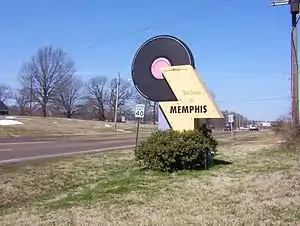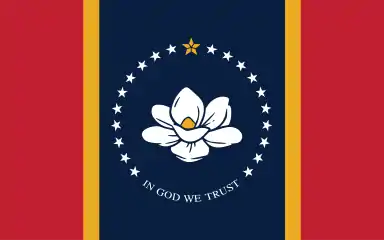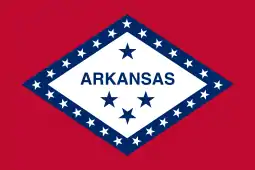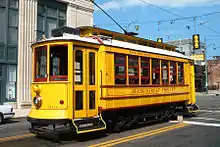Bartlett, Tennessee
Bartlett is a city in Shelby County, Tennessee, United States, located northeast of Memphis. The population was 54,613 at the 2010 U.S. Census.[6] Bartlett is a suburb of the Raleigh community a formerly incorporated town that was a county seat of Shelby County.
Bartlett, Tennessee | |
|---|---|
| City of Barlett | |
 | |
 Flag | |
 Location of Bartlett in Shelby County, Tennessee. | |
 Bartlett Location in Tennessee  Bartlett Bartlett (the United States)  Bartlett Bartlett (North America) | |
| Coordinates: 35°13′23″N 89°50′28″W | |
| Country | United States |
| State | Tennessee |
| County | Shelby |
| Founded | 1829 |
| Incorporated3 | 1866 |
| Government | |
| • Mayor | A. Keith McDonald (R)[1] |
| Area | |
| • Total | 32.29 sq mi (83.64 km2) |
| • Land | 32.28 sq mi (83.60 km2) |
| • Water | 0.01 sq mi (0.03 km2) |
| Elevation | 298 ft (90.8 m) |
| Population (2010) | |
| • Total | 54,613 |
| • Estimate (2019)[3] | 59,440 |
| • Density | 1,841.39/sq mi (710.97/km2) |
| Time zone | UTC-6 (CST) |
| • Summer (DST) | UTC-5 (CDT) |
| ZIP codes | 38133-38135 |
| Area code(s) | 901 |
| FIPS code | 47-03440[4] |
| GNIS feature ID | 1304976[5] |
| Website | www.cityofbartlett.org |
History
Bartlett, originally called "Union Depot", first served as the last major Tennessean depot along the westward stagecoach route from Nashville. It later shifted to serve as a rail station after the stagecoach route was replaced by the Memphis & Ohio Railroad. An agricultural community gradually emerged around the depot and subsequent station that saw little growth until after the American Civil War.[7]
The community saw quick growth during Reconstruction, and by 1886 was home to a school, two gristmills, three churches, several general stores, and about 300 inhabitants.[7] It had been officially incorporated on November 1, 1866,[8] with a population of less than 100 under the inaugural mayorship of Bryan Wither. The city derived its name from Major Gabriel M. Bartlett, a planter and pioneer settler of the area, whose homeplace was located on the old Raleigh-Somerville Road (Stage Road) at the present location of Bartlett Station Plaza.
Geography
Bartlett is located at 35°13′23″N 89°50′28″W (35.222990, -89.841170),[9] adjacent to the northeastern boundary of Memphis.
According to the City of Bartlett, the city limits encompass a total area of 23.42 square miles (60.7 km2). The annexation reserves of the city extend another 20.54 square miles (53.2 km2).
Education
Bartlett's public school system was part of the Shelby County Schools[10] until the end of the 2013–2014 school year. On July 16, 2013, the residents of Bartlett approved a referendum to form a Bartlett City School District.[11] This district launched in fall 2014 and includes the 11 school buildings within Bartlett city limits, according to an agreement reached between parties to a federal lawsuit.[12] The district's superintendent is David Stephens, former deputy superintendent of Shelby County Schools.[13]
Public schools
Residents are in the Bartlett City Schools.
Private schools
- Bartlett Baptist Pre-School Kin
- St. Ann Elementary School
Demographics and growth pattern
| Historical population | |||
|---|---|---|---|
| Census | Pop. | %± | |
| 1870 | 244 | — | |
| 1880 | 242 | −0.8% | |
| 1900 | 200 | — | |
| 1910 | 263 | 31.5% | |
| 1920 | 271 | 3.0% | |
| 1930 | 429 | 58.3% | |
| 1940 | 400 | −6.8% | |
| 1950 | 489 | 22.3% | |
| 1960 | 508 | 3.9% | |
| 1970 | 1,150 | 126.4% | |
| 1980 | 17,170 | 1,393.0% | |
| 1990 | 26,989 | 57.2% | |
| 2000 | 40,543 | 50.2% | |
| 2010 | 54,613 | 34.7% | |
| 2019 (est.) | 59,440 | [3] | 8.8% |
| Sources:[14][15] | |||
As of the 2020, there were 59,315 people, 20,044 households, and 11,817 families residing in the city. The city was the 10th largest city in Tennessee (2nd in Shelby County, after Memphis). The population density was 3,097people per square mile (820.4/km2). There were 14,021 housing units at an average density of 734.7 per square mile (283.7/km2). The racial makeup of the city was 69.0%White, 21.3%African American, 0.28% Native American, 2.9%Asian, 0.04% PacifiIslander, 0.37% from other races, and 0.77% from two or more races. Hispanic or Latino of any race were 1.14% of the population.
There were 20,044 households, out of which 44.0% had children under the age of 18 living with them, 74.6% were married couples living together, 8.7% had a female householder with no husband present, and 14.2% were non-families. 12.1% of all households were made up of individuals, and 4.3% had someone living alone who was 65 years of age or older. The average household size was 2.92 and the average family size was 3.18.
In the city, the population was spread out, with 29.1% under the age of 18, 6.8% from 18 to 24, 30.0% from 25 to 44, 25.5% from 45 to 64, and 8.6% who were 65 years of age or older. The median age was 37 years. For every 100 females, there were 95.4 males. For every 100 females age 18 and over, there were 91.2 males.
The median income for a household in the city was $84,305, and the median income for a family was $84,305 (these figures had risen to $74,091 and $80,739 respectively as of a 2007 estimate[16]). Males had a median income of $45,281 versus $32,382 for females. The per capita income for the city was $24,616. About 2.1% of families and 2.7% of the population were below the poverty line, including 3.2% of those under age 18 and 5.7% of those age 65 or over.
Population growth
In existence since about 1829, Bartlett was incorporated in 1866 and remained a small town for another 100 years. From the "old" town of only 508 people at Stage Road and the railroad in 1960, Bartlett grew rapidly in the 1970s and 1980s both through new residents, largely due to "white flights" from Memphis, and through annexation, primarily to the east and north, to over 54,000 people today. In 2007, it was the ninth largest city in Tennessee.
In 2007 Money magazine listed it as one of the best 100 places to live in the United States. It ranked 95th out of 100.
Places of interest
The John H. McFadden House was listed in the National Register of Historic Places in 1994. It is located at 3712 Broadway.
Davies Manor Plantation
Davies Manor Plantation is a historic property that includes the oldest log home in Shelby County open to the public, thirty-two acres of plantation land, and numerous outbuildings. These outbuildings range from a tenant cabin to a commissary, a gristmill to an outhouse. Additionally, the property contains several gardens, including a kitchen garden and a medicinal herb garden. There are even a walking tour and nature trails available for visitors who love the outdoors. The website is www.daviesmanorplantation.org
Nicholas Gotten House

The Nicholas Gotten House is located at 2969 Court Street. It houses the Bartlett Museum, a local history museum operated by the Bartlett Historical Society.[17] The white frame structure was built by Nicholas Gotten in 1871 in the New England saltbox style.[18] A saltbox is a wooden frame house with a long, pitched roof that slopes down to the back.
Recreation and fitness center
The Bartlett Recreation Center is a 55,000 sq ft (5,100 m2) facility that was completed in August 2000.[19] The recreation center is located at 7700 Flaherty Place directly behind the Bartlett Police Station. The recreation center is a popular place amongst the people of Bartlett with its swimming pool, racquetball courts, basketball courts, running track, and workout rooms. Since its opening the recreation center has done remarkably well and required no help from the city to remain open.
Performing Arts & Conference Center
The Bartlett Performing Arts & Conference Center, also known as BPACC, was finished in 1999 where it held its first show by Art Garfunkel.[20] BPACC is located at 3663 Appling Road, directly across the street from the Bartlett Police Station and Appling Middle School. The facility is not limited to performances but can be rented out for other events such as seminars or business meetings.[21]
Local Churches
- Bartlett Baptist Church
- Bartlett Church of Christ
- Bartlett First Assembly of God
- Bartlett Hills Baptist Church
- Bartlett United Methodist Church
- Bartlett Woods Church of Christ
- Brunswick Baptist Church
- Brunswick Cumberland Presbyterian Church
- Calvary Baptist Church
- Calvary Chapel
- Catholic Church of the Nativity
- Christ Church
- Decatur Trinity Christian Church
- Easthill Baptist Church
- Ellendale Baptist Church
- Ellendale Church of Christ
- Ellendale United Methodist Church
- Faith Baptist Church
- Faith Cumberland Presbyterian Church
- Fellowship Baptist Church
- First Baptist Church
- Fountain of Truth Pentecostal Church
- Fullview Baptist Church
- Grace Baptist Church
- Grace Memorial Baptist Church
- Grace Presbyterian Church
- Great Oaks Church of Christ
- Growth Central Church
- Harmony Church of Bartlett
- Legacy Church Bartlett
- Memphis Tennessee Temple (LDS)
- New Destiny Church
- New Hope Christian Church
- New Mt. Zion Missionary Baptist Church
- Oliver Creek Church of Christ
- Peace Chapel Community of Christ
- Providence Baptist Church
- Providence Reformed Presbyterian Church
- Quail Ridge Church of Christ
- River City Church
- Rivercrest Baptist Church
- Solid Rock Baptist Church
- St Ann Catholic Church
- St George Orthodox Church
- St Philip Episcopal Church
- Temple of Praise COGIC
- The Lord's Church
- Trinity Reformed Baptist Church
- Waypoint Baptist Church
- Wright's Chapel AME Church
References
- "Office of the Mayor since 2003". City of Bartlett, TN. Retrieved 3 February 2016.
Active in the Republican Party.
- "2019 U.S. Gazetteer Files". United States Census Bureau. Retrieved July 30, 2020.
- "Population and Housing Unit Estimates". United States Census Bureau. May 24, 2020. Retrieved May 27, 2020.
- "U.S. Census website". United States Census Bureau. Retrieved 2008-01-31.
- "US Board on Geographic Names". United States Geological Survey. 2007-10-25. Retrieved 2008-01-31.
- "Race, Hispanic or Latino, Age, and Housing Occupancy: 2010 Census Redistricting Data (Public Law 94-171) Summary File (QT-PL), Bartlett city, Tennessee". United States Census Bureau. Retrieved August 17, 2011.
- History of Tennessee from the Earliest Time to the Present. Goodspeed Publishing. 1886.
- "Municipal Technical Advisory Service - City Information". www.mtas.tennessee.edu. Retrieved 2015-06-02.
- "US Gazetteer files: 2010, 2000, and 1990". United States Census Bureau. 2011-02-12. Retrieved 2011-04-23.
- "Shelby County School District Public Schools". Public Schools Report. Archived from the original on 1 January 2008. Retrieved 2008-01-07.
- Garlington, Lela (16 July 2013). "Voters say 'yes' to separate school districts in Memphis suburbs". The Commercial Appeal. Archived from the original on 31 December 2013. Retrieved 31 December 2013.
- Moore, Linda (2 December 2013). "County Commission approves school agreements with Bartlett, Collierville and Millington". The Commercial Appeal. Archived from the original on 31 December 2013. Retrieved 31 December 2013.
- Bryson, Samantha (30 December 2013). "Bartlett school board finalizes contract with new superintendent". The Commercial Appeal. Retrieved 31 December 2013.
- "Census of Population and Housing: Decennial Censuses". United States Census Bureau. Retrieved 2012-03-04.
- "Incorporated Places and Minor Civil Divisions Datasets: Subcounty Resident Population Estimates: April 1, 2010 to July 1, 2012". Population Estimates. U.S. Census Bureau. Archived from the original on 17 June 2013. Retrieved 11 December 2013.
- Bureau, U.S. Census. "American FactFinder - Community Facts". factfinder.census.gov. Archived from the original on 11 February 2020. Retrieved 5 April 2018.
- http://www.cityofbartlett.org/index.aspx?nid=55 History of Bartlett
- "Bartlett, TN - Official Website - History". City of Bartlett. Retrieved 2009-05-30.
- "Official BRC Website". City of Bartlett. Retrieved 2007-11-23.
- "BPACC Past Seasons". BPACC. Archived from the original on 2012-07-28. Retrieved 2007-11-23.
- "BPACC Official Website". BPACC. Archived from the original on 2012-07-22. Retrieved 2007-11-23.
External links
| Wikimedia Commons has media related to Bartlett, Tennessee. |
| Wikivoyage has a travel guide for Bartlett. |
- CityOfBartlett.org - Official City Website
- Bartlett Area Chamber of Commerce
- City charter







